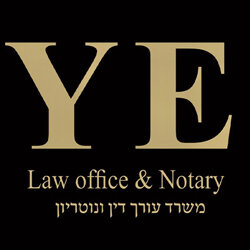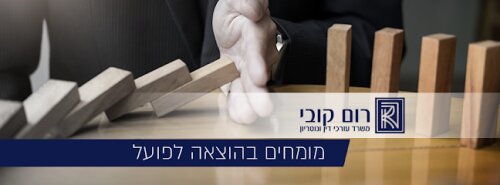Best ADR Mediation & Arbitration Lawyers in Israel
Share your needs with us, get contacted by law firms.
Free. Takes 2 min.
Or refine your search by selecting a city:
List of the best lawyers in Israel
About ADR Mediation & Arbitration Law in Israel
Alternative Dispute Resolution (ADR) in Israel, encompassing both mediation and arbitration, provides effective mechanisms for resolving disputes outside the traditional courtroom. In Israel, ADR is increasingly popular due to its flexibility, confidentiality, and efficiency in settling disputes. Mediation involves a neutral third-party facilitator who helps disputing parties reach a voluntary agreement. Arbitration, on the other hand, involves an arbitrator who listens to both sides and makes a binding decision. The Israeli legal framework supports ADR through various laws and regulations, ensuring fair and equitable processes.
Why You May Need a Lawyer
While ADR offers a more streamlined approach to resolving disputes, legal advice can be invaluable in several situations:
- Complex Disputes: If the dispute involves intricate legal, commercial, or technical issues, a lawyer can help dissect these complexities.
- Drafting Agreements: A lawyer can assist in drafting well-constructed arbitration or mediation agreements to avoid future conflicts.
- Understanding Rights: Legal counsel ensures you understand your rights and obligations under the ADR process.
- Strategic Advice: Lawyers can provide strategic insights to optimize outcomes in both mediation and arbitration settings.
- Enforcement of Awards: Legal assistance might be necessary to enforce arbitration awards or mediated agreements, especially if challenged in court.
Local Laws Overview
ADR in Israel is governed by several legal instruments:
- The Arbitration Law, 1968, outlines procedures and guidelines for arbitration, including appointment of arbitrators and enforcement of arbitration awards.
- Mediation guidelines are less formalized than arbitration but benefit from procedural frameworks provided by leading organizations and institutes in Israel.
- The Israeli courts encourage ADR, especially mediation, during litigation processes as reflected in various court regulations.
- Several government-supported initiatives and amendments have been enacted to encourage ADR as a preferred method for dispute resolution.
Frequently Asked Questions
What is the difference between mediation and arbitration?
Mediation involves a neutral mediator who facilitates negotiations between parties to help reach a mutual agreement, while arbitration involves an arbitrator who makes a binding decision for the parties.
How is an arbitrator chosen in Israel?
Parties can mutually agree on an arbitrator, or if they cannot agree, an arbitrator can be appointed by an arbitration institution or court.
Is an arbitration award enforceable in Israel?
Yes, an arbitration award in Israel is binding and enforceable, similar to a court judgment, although parties can agree otherwise. Enforcement requires a court approval.
Can I appeal an arbitration decision in Israel?
Generally, arbitration decisions are final, but under specific circumstances defined by law, such as arbitrator misconduct or procedural irregularities, they may be challenged in court.
Are mediation processes confidential in Israel?
Yes, confidentiality is a core principle of mediation in Israel, ensuring that discussions and documents are not disclosed outside the process.
What types of disputes are suitable for ADR in Israel?
ADR is suitable for a wide range of disputes, including commercial, family, labor, real estate, and international disputes.
Do I need a lawyer for mediation or arbitration?
While it's not obligatory, having a lawyer can be beneficial for legal guidance, ensuring your interests are protected and understanding complex legal aspects.
What is the cost of ADR compared to going to court?
ADR is often less costly than litigation, as it minimizes court fees, legal expenses, and typically resolves disputes faster.
How long does the ADR process take in Israel?
The duration varies depending on the case complexity and parties' willingness but is generally faster than court proceedings.
Can ADR be conducted in languages other than Hebrew?
Yes, parties can agree on a different language for the ADR process, especially in cases involving international elements.
Additional Resources
Consider exploring the following resources for further information on ADR in Israel:
- Ministry of Justice: Offers comprehensive details about ADR procedures and legal frameworks.
- Israeli Institute of Commercial Arbitration (IICA): Provides guidelines, training, and arbitrator appointments.
- Court Mediation Centers: Located within various districts, these centers provide mediation services and information.
- The Israeli Bar Association: Can help locate specialized ADR lawyers and offer legal assistance.
Next Steps
If you require legal assistance in ADR Mediation & Arbitration in Israel, consider the following steps:
- Research: Familiarize yourself with ADR processes and options available in your specific case.
- Consult a Lawyer: Seek legal advice from a lawyer specializing in ADR to understand your rights and options.
- Prepare Documentation: Collect all relevant documents and evidence to strengthen your mediation or arbitration case.
- Select an ADR Type: Choose between mediation or arbitration based on the nature and needs of your dispute.
- Choose a Qualified Neutral: Select a mediator or arbitrator who is experienced and trustworthy.
- Engage in Process: Actively participate in the chosen ADR methodology, keeping communication open and cooperative.
Lawzana helps you find the best lawyers and law firms in Israel through a curated and pre-screened list of qualified legal professionals. Our platform offers rankings and detailed profiles of attorneys and law firms, allowing you to compare based on practice areas, including ADR Mediation & Arbitration , experience, and client feedback.
Each profile includes a description of the firm's areas of practice, client reviews, team members and partners, year of establishment, spoken languages, office locations, contact information, social media presence, and any published articles or resources. Most firms on our platform speak English and are experienced in both local and international legal matters.
Get a quote from top-rated law firms in Israel — quickly, securely, and without unnecessary hassle.
Disclaimer:
The information provided on this page is for general informational purposes only and does not constitute legal advice. While we strive to ensure the accuracy and relevance of the content, legal information may change over time, and interpretations of the law can vary. You should always consult with a qualified legal professional for advice specific to your situation.
We disclaim all liability for actions taken or not taken based on the content of this page. If you believe any information is incorrect or outdated, please contact us, and we will review and update it where appropriate.
Browse adr mediation & arbitration law firms by city in Israel
Refine your search by selecting a city.














